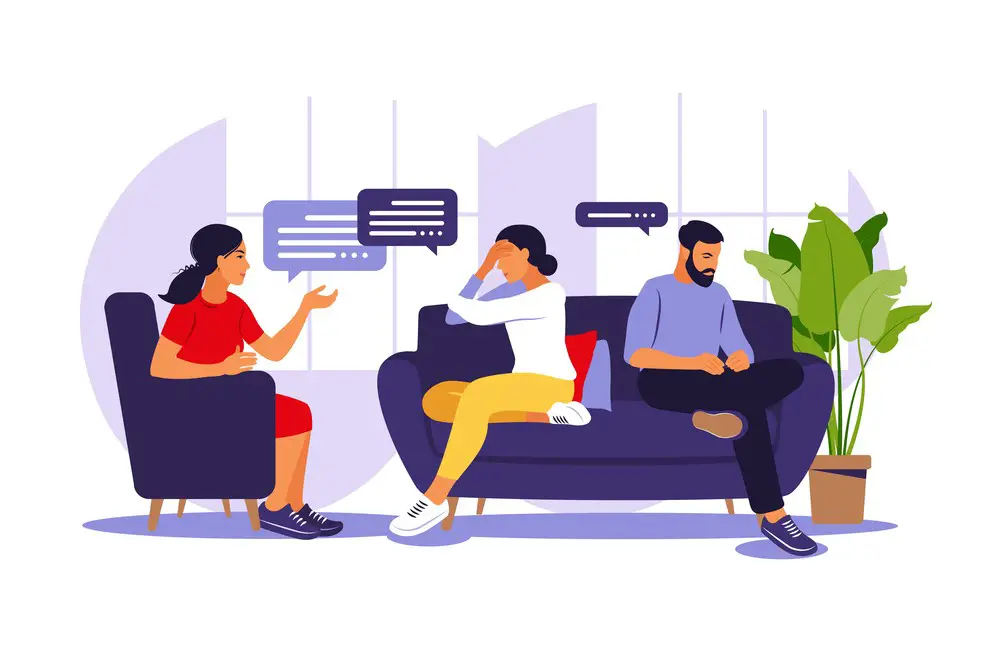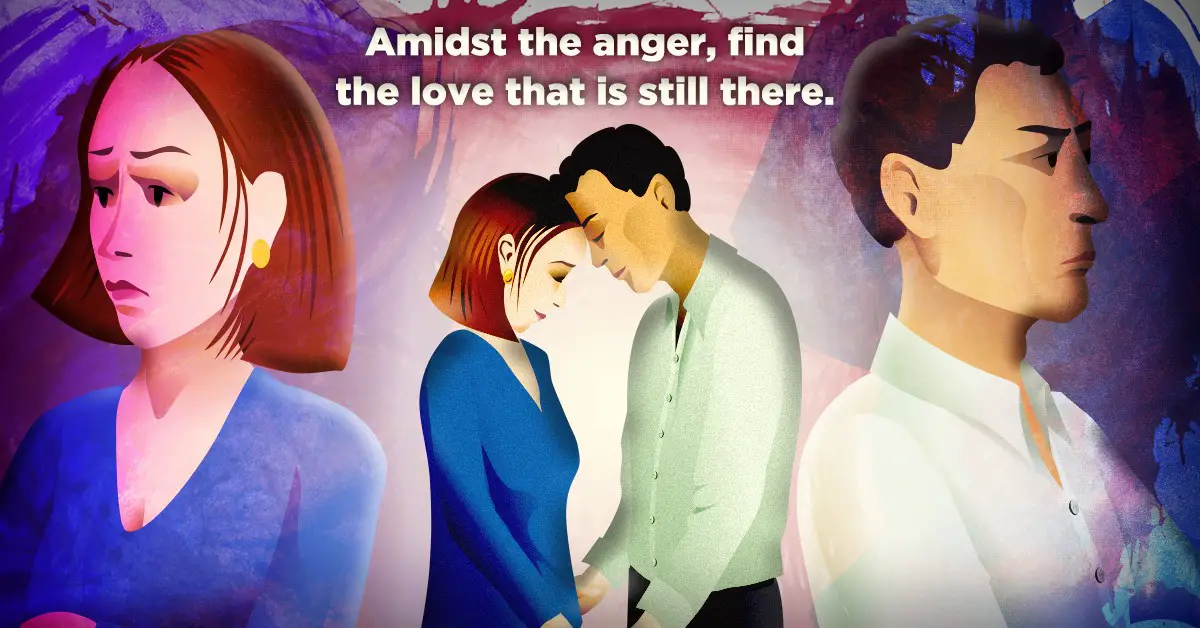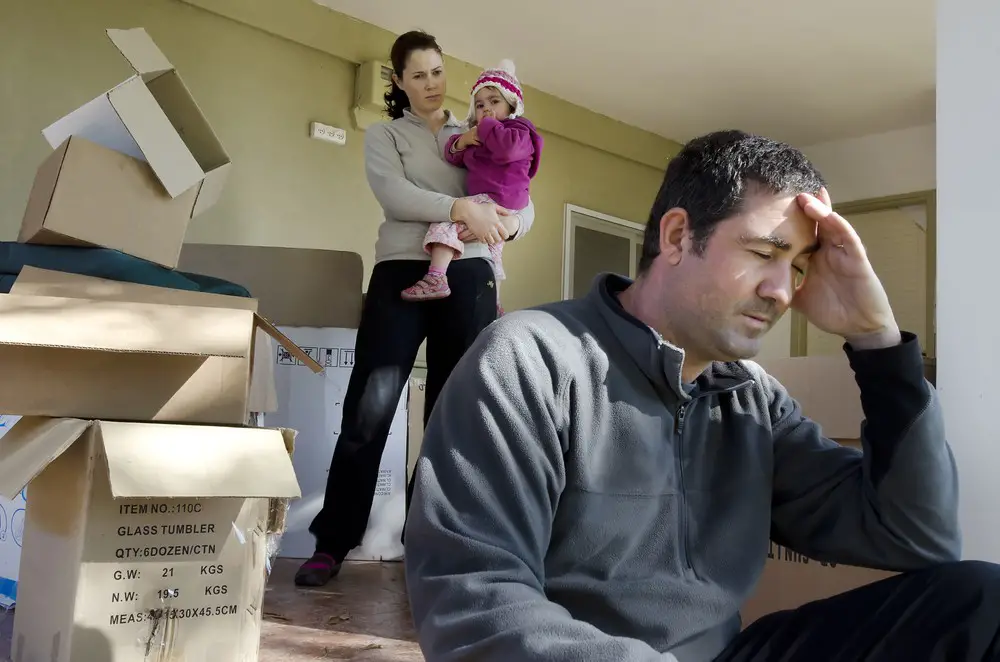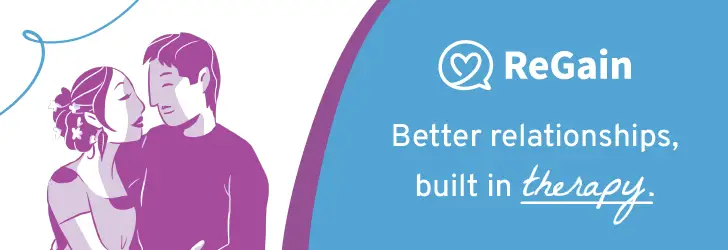As a BetterHelp affiliate, we receive compensation from BetterHelp if you purchase products or services through the links provided
Couples therapy is an effective tool for addressing and resolving relationship issues. It offers a secure environment where partners can discuss their concerns and enhance their strengths. Nonetheless, there are situations where couples therapy might not be the optimal solution or where both partners require more intense individual therapy.
In some cases, couples face challenges better addressed through individual therapy before engaging in couples therapy. This may include situations where partners struggle with mental health issues, substance abuse, or unresolved trauma. It’s crucial to recognize that couples therapy should never be seen as a one-size-fits-all solution, and it may not be appropriate to use it in every scenario.
Key Takeaways
- Couples therapy isn’t always the right solution for relationship challenges; individual therapy may be necessary first.
- Some situations, such as mental health issues, substance abuse, and unresolved trauma, may require a different approach.
- Acknowledging that couples therapy should be tailored to each couple’s specific needs and context is essential.
 Understanding Couples Therapy
Understanding Couples Therapy
Couples therapy is a form of therapy that focuses on improving the relationship between two partners. It aims to help couples work through their issues and reconnect lovingly and meaningfully. A key aspect of couples therapy is enhancing communication between partners. This helps to build understanding and improve relational skills.
When you enter couples therapy, you can expect to work alongside your partner and a trained therapist. The therapist is there to help facilitate and guide conversations, ensuring each partner feels heard and understood. Couples therapy offers a safe, supportive environment where you can openly discuss your feelings, thoughts, and concerns. This allows for the development of insight into patterns and behaviors that might be negatively affecting your connection.
Couples therapy is not a one-size-fits-all approach. Different people will respond to different methods and techniques. An important aspect of couples therapy is finding the right match between the therapist, their approach, and your relationship needs. A good fit ensures that you and your partner will benefit from the experience and develop the tools needed to foster a strong, loving relationship.
Some common techniques used in couples therapy include:
- Active listening: paying close attention to your partner’s words and repeating what you hear. This demonstrates that you are truly listening and working to understand their perspective.
- Identifying patterns: Uncovering recurring issues or conflicts can help you and your partner address and resolve them. This creates a healthier, more supportive relationship dynamic.
- Emotion-focused therapy encourages partners to explore their feelings and emotional needs, fostering deeper empathy and understanding.
Remember, the goal of couples therapy is not to place blame or find fault in either partner. Instead, it’s about building a stronger connection, improving communication, and developing deeper understanding and love for one another. Couples counseling can be an invaluable resource for many relationships, helping to heal, grow, and thrive together.
Reignite your bond with Regain. Opt for online couples counseling today!
When Therapy May Not Work
Sometimes, despite your best efforts, couples therapy may not be the most effective solution for you and your partner. Some certain circumstances and factors could make it challenging for therapy to bring about the desired change in your relationship.
In cases where one or both partners have severe mental health issues, it might be necessary to address these health issues first with individual therapy. Couples therapy can become less effective when one person is dealing with complex personal struggles, as it might hinder them from fully engaging in the process and contributing positively to change.
Effort and motivation from both parties are crucial for therapy to work. If one partner is resistant or uninterested in putting in the required effort to mend and improve the relationship, this lack of motivation could hinder progress. Remember, change requires a collaborative effort from both you and your partner.
Long-established patterns and behaviors can also make it difficult for couples therapy to achieve significant results. Suppose you and your partner are continuously stuck in the same arguments or destructive patterns. In that case, it might take a more intensive approach and additional professional help to break free and experience genuine, lasting improvement.
Another factor that could impact the effectiveness of couples therapy is when external influences and stressors, such as work or persistent health issues, continually strain the relationship. In such cases, it’s essential to address and manage these outside stressors as well as to create an environment where therapeutic change can occur.
In conclusion, couples therapy may not always be the best solution for every couple, particularly when individual mental health issues, an unwillingness to change, or external factors are present. Recognizing and addressing these obstacles is key to determining the most suitable path to help improve your relationship.
Discover love’s potential. Start Regain counseling now
Identifying Unhealthy and Destructive Relationships
Trust is essential for maintaining a strong emotional bond and healthy communication in a relationship. However, sometimes in life, you may find yourself in a relationship where repeated betrayals have shattered trust. This can lead to a toxic environment, and it’s critical to recognize when couples therapy may not be the answer.
One key sign of an unhealthy and destructive relationship is the presence of abuse, which can manifest in various ways, such as physical violence, emotional manipulation, or verbal attacks. Domestic abuse is a severe issue that requires immediate attention. In a situation where safety is at risk, it is vital to prioritize getting to a secure place away from the violence before considering couples therapy.
Emotional abuse is more subtle and can be as damaging as physical violence. Persistent anger, blame, and frustration in the relationship can make you feel constantly belittled, unsupported, or fearful. If your partner consistently refuses to acknowledge their behavior as damaging, couples therapy may not be appropriate and can even worsen the situation.
Another indicator of an unhealthy relationship is a lack of personal boundaries. If your partner disregards your feelings and needs, it can lead to an imbalance of power and a loss of autonomy. In such cases, working on self-care and establishing strong personal boundaries might be more helpful than pursuing couples therapy.
To sum up, if you’re experiencing any of the following in your relationship:
- Continuous betrayal of trust
- Any form of abuse (physical, emotional, verbal)
- Persistent negative emotions (anger, blame, frustration)
- Disregard for personal boundaries
It might be time to reconsider whether couples therapy is the right approach. In such cases, do not hesitate to seek help from trusted friends, support groups, or therapists specializing in personal counseling. Your well-being should always come first.
Turn the page with Regain. Embrace online couples’ guidance
Dealing with Substance and Addiction Issues
When it comes to couples therapy, there are times when addressing substance abuse, and addiction issues can be tough. If one or both partners struggle with addiction, it’s important to recognize that couples therapy might not be the most effective treatment option.
In many cases, addiction can create a whole new set of relationship challenges that can’t be resolved without first addressing the addiction. It’s essential for the person battling addiction to receive specialized treatment for their substance abuse. You and your partner might benefit from individual therapy or support groups as a first step before considering couples therapy.
Understanding that couples therapy isn’t designed to treat addiction directly is crucial. While the therapist can help you both navigate the relationship problems that stem from addiction, they’re not equipped to address the addiction itself. Intervention by a professional dealing with addiction, such as an addiction counselor or a recovery coach, will often yield more successful results.
Couples therapy can be beneficial once the addiction is managed or resolved, allowing both partners to focus on rebuilding trust, communication, and understanding. This can help create a stronger, healthier relationship and support recovery.
In summary, dealing with substance abuse and addiction requires a unique approach. Prioritizing individual treatments and support systems can lead to a more successful outcome in both addiction recovery and the relationship. Couples therapy can play an important role in your journey, but it should be considered at the appropriate stage of your recovery.
Seek clarity, and nurture intimacy. Try Regain online therapy
Therapy and Conflict Resolution
Every relationship sometimes experiences conflict, and it’s a natural part of any healthy partnership. However, when these conflicts become overwhelming or unmanageable, you might consider couples therapy as a way to resolve them.
In couples therapy, a trained professional will help you improve your communication skills and address specific issues within your relationship. Often, the therapist will work with both parties to understand the dynamics and patterns that lead to arguments and conflicts. By facilitating healthy communication and promoting conflict resolution, therapy can help alleviate relationship distress.
While couples therapy can be a valuable resource, it is important to recognize when it may not be appropriate or effective. Some situations that might require a different approach include:
- If one partner is unwilling or unable to participate in therapy, it will be challenging to achieve meaningful progress. Couples therapy requires the commitment and active participation of both individuals.
- Couples therapy isn’t the right solution if there is ongoing abuse within the relationship, whether physical, emotional, or verbal. In this case, it is crucial to prioritize safety and seek support from resources that help abuse victims.
- Couples therapy might be insufficient if one or both partners struggle with untreated mental health issues or addiction. In these situations, individual therapy might be more appropriate.
Ultimately, it’s essential to consider all factors when deciding if couples therapy is right for your relationship. While it can be a powerful tool for improving communication and conflict resolution, it’s not a cure-all for every situation.
 The Role of Individual Therapy
The Role of Individual Therapy
Individual therapy can play a crucial role in addressing relationship difficulties. Sometimes, the challenges you face in your relationship are rooted in personal issues that need to be resolved independently. In these cases, engaging in individual therapy before attempting couples therapy may be more appropriate and beneficial for you and your partner.
When you attend individual therapy sessions, you can focus on understanding and addressing your emotional needs, communication patterns, and coping mechanisms. By working on these areas, you can clarify the root causes of your relationship difficulties and develop the skills needed to navigate them more effectively.
One key benefit of individual therapy is its safe space for self-reflection and exploration. With the support of a therapist, you can identify patterns in your behavior and thought processes that contribute to relationship problems. Through this process, you may uncover unresolved past issues or traumas that impact your current relationship dynamics.
It’s important to remember that not all relationship difficulties require couples therapy. In some cases, individual therapy may be sufficient to address certain challenges and promote growth and healing within the relationship. However, if you and your partner struggle with persistent problems despite individual efforts, it may be time to consider couples therapy as the next step.
 Sexual and Intimacy Issues
Sexual and Intimacy Issues
When you and your partner face difficulties with sex and intimacy, it’s essential to recognize whether couples therapy is the appropriate solution. There are certain situations where it may not be ideal to address these issues.
Firstly, if the sexual issues stem from a medical condition, consulting with a healthcare professional rather than a couples therapist is important. Conditions like erectile dysfunction, pain during intercourse, and hormonal imbalances require medical insight and intervention. By addressing these issues with a medical professional, you can then resume couples therapy if needed, focusing on building a satisfying emotional and intimate connection.
Secondly, couples therapy may not be suitable when one partner struggles with unresolved personal trauma. For example, if a person has experienced sexual abuse or assault, they may need individual therapy to address these experiences before engaging in couples therapy. Sometimes, the therapist may advise seeking a specialist’s help in trauma to address these issues more effectively.
Lastly, if a lack of desire for sex or intimacy is due to incompatible sexual preferences, couples therapy may be unable to change these fundamental differences. You might need to consider open communication and exploring various options to find a mutually satisfying compromise outside therapy.
In summary, while couples therapy can be helpful for many couples experiencing sexual and intimacy issues, it’s essential to be aware of when it’s not the best course of action. Addressing medical conditions, seeking individual therapy for unresolved traumas, and discussing sexual incompatibilities openly are critical steps for ensuring you and your partner find a meaningful and fulfilling intimate connection.
Conditions for Successful Couples Therapy
When considering couples therapy, it’s important to determine whether it’s the right choice for you and your partner. Several factors contribute to the success of couples therapy sessions.
Firstly, you and your partner should be willing to participate in therapy. Involving yourselves in psychotherapy, family therapy, or counseling can only work if both parties are open to sharing their emotions and working on their relationship. A dedicated therapist will help guide you through the process, offering support and encouragement, but the real progress stems from your commitment and cooperation.
Another essential element for successful couples therapy is finding the right therapist. Marriage counseling requires you and your partner to feel comfortable and trust the therapist. You can search for a local professional or consider online therapy options. It’s important to remember that it might take time to find the perfect fit—don’t be afraid to shop around.
Once engaged in therapy, applying the techniques and strategies learned is crucial for progress. Cognitive behavioral therapy (CBT) and behavioral therapy are common approaches to couples therapy. These methodologies focus on understanding and modifying specific thought patterns and behaviors that negatively impact your relationship. By applying these therapeutic tools, you’ll be better equipped to face your relationship challenges.
Finally, remember that progress doesn’t happen overnight. Couples therapy often takes time and dedication. Be patient with yourselves and each other as you move through the process. The journey toward a healthier relationship might be challenging, but successful couples therapy can be achieved with genuine commitment and open communication.
 The Impact of Infidelity and Affairs
The Impact of Infidelity and Affairs
When you discover infidelity or an affair in your relationship, it can feel like the world has come crashing down. Trust has been broken, and you may feel devastated and betrayed. How do you decide if couples therapy is right in such a situation?
In some instances, couples therapy might not be the best solution. If one partner is still involved in the affair and unwilling to give it up, attending therapy sessions could be futile. Both partners must be completely committed to rebuilding trust and working through infidelity’s challenges.
Furthermore, if the unfaithful partner is unwilling to take responsibility for their actions or shows no signs of genuine remorse, in that case, making meaningful progress in couples therapy may be challenging. Both individuals must actively participate in the healing process, including accepting responsibility and showing empathy for the pain caused by the affair.
It’s also important to consider the level of emotional safety within the relationship. Couples therapy can be an incredibly vulnerable experience, requiring both individuals to be open and honest about their feelings. If one partner feels threatened or unsafe due to the continued secrets, hostility, or emotional manipulation, couples therapy might not be the most effective option.
In conclusion, while couples therapy can be an extremely valuable tool for many couples dealing with infidelity and the challenges of rebuilding trust, it may not be appropriate in all situations. Carefully consider the willingness of both parties to work together, take responsibility, and foster emotional safety before committing to couples therapy. Remember, healing is a process that takes time, effort, and, most importantly, the cooperation of both partners.
Discover love’s potential. Start Regain counseling now
Making the Most of Couples Therapy: Individual or Together
Couples therapy is a journey that can be embarked on together or separately, depending on the needs and situation of the relationship. Here’s how to maximize the benefit of both approaches:
1. Set Clear Goals and Expectations:
- Together: Communicate openly about what you both hope to achieve in therapy.
- Individually: Reflect on your goals and how they align with your partner’s.
2. Maintain Open Communication:
- Together: Practice active listening and express your feelings honestly.
- Individually: Share what you’re learning in individual sessions with your partner if appropriate.
3. Show Support and Understanding:
- Together: Encourage each other, acknowledging progress and setbacks.
- Individually: Understand that individual therapy may bring up personal issues that must be dealt with separately but can ultimately strengthen the relationship.
4. Work on Homework Together:
- Together: Engage in exercises or readings suggested by the therapist as a couple.
- Individually: Share insights and discoveries from individual work when relevant.
5. Respect Boundaries:
- Together: Recognize the importance of privacy and trust within the therapeutic process.
- Individually: Respect your partner’s need for space and individual growth within the therapy process.
6. Evaluate Progress Regularly:
- Together: Regularly discuss what’s working and what’s not, and adjust as needed.
- Individually: Reflect on personal growth and how it’s contributing to the relationship’s improvement.
By focusing on these areas, couples can ensure that they are fully engaging in the therapeutic process, whether attending sessions together or individually. The key is a shared commitment to growth, openness, and mutual respect.
 When Divorce or Separation Might Be The Answer
When Divorce or Separation Might Be The Answer
Sometimes, despite your best efforts, you may realize that divorce or separation is the best solution for you and your partner. It’s important to understand when couples therapy is inappropriate and when to consider parting ways.
If your core values and goals are completely different and there is no room for compromise, it could be a sign that your relationship may not be able to overcome these differences. No matter how much you try to adjust and work through issues in therapy, if you can’t align your fundamental ideals, it may be best to accept that you’re not the right fit for each other.
Another reason to consider divorce or separation is if there is a history of physical or emotional abuse in your relationship. An abusive partner usually has a pattern of behavior that is difficult to change, even with therapy, and your safety and well-being should always be the top priority. In such instances, it may be safer and healthier for you to leave the relationship.
Moreover, if one or both of you are unwilling to put in the effort to make the relationship work, couples therapy may not be beneficial. A successful therapy outcome requires commitment, accountability, and participation from both parties. If either or both of you are unwilling to change or take responsibility for the issues, therapy is unlikely to save your relationship.
Lastly, if you’ve both grown emotionally distant and there is no desire or effort to reconnect, it could be a sign that the relationship has run its course. Sometimes people grow apart and realize that they’re no longer compatible. Trying to force a connection through therapy might only prolong the inevitable breakup in these cases.
Deciding to end a relationship is never easy, but understanding when therapy may not be suitable can help you make the right choice.
Addressing Financial Barriers
One of the factors that might deter couples from seeking therapy is the cost involved. The good news is there are ways to address this financial barrier and make couples therapy more accessible for you and your partner.
Insurance Coverage: First, check if your health insurance covers couples therapy. Some policies offer coverage for therapy sessions, making it more affordable for members. Don’t hesitate to contact your insurance provider for clarification on your benefits.
Sliding Scale Fees: Many therapists understand couples’ financial constraints and offer a sliding scale fee structure. This means the therapist adjusts their fees according to your income level, making sessions more budget-friendly.
Community Resources: Look out for free or low-cost couples therapy resources in your community. Some organizations, such as non-profits or religious institutions, may provide support and counseling services for couples at no or minimal cost.
Online Therapy: With the increasing availability of digital platforms, online therapy has become popular. Not only does it provide flexibility and convenience, but it also tends to be more affordable compared to traditional in-person therapy sessions.
Planning and Budgeting: If possible, plan and budget for the cost of therapy sessions. Discuss with your partner and prioritize couples therapy as an investment in your relationship’s well-being. Therapy can become a more manageable commitment by setting aside funds and preparing for the expenses.
Remember, prioritizing the emotional well-being of your relationship is important even when finances are a concern. By exploring these options and being open to various avenues, you can find solutions within your budget, making couples therapy accessible and beneficial to your relationship.
Adopting Self-help Measures
Sometimes, professional couples therapy may not be the best approach for your relationship. Instead, you might explore self-help resources to address problems and improve your connection. Engaging with self-help tools, such as books, workshops, and anger management courses, can empower both partners to take responsibility and manage their relationship dynamics.
Self-help books, written by experienced relationship experts offer practical knowledge and guidance. You’ll find valuable insights on effective communication, conflict resolution, and relationship maintenance. You can discuss and implement the book’s recommendations to strengthen your bond as you read. A wide variety of self-help books is available, so choosing one that resonates with your specific needs is essential.
Workshops, whether online or in-person, can be instrumental in relationship improvement. They provide a structured and interactive learning environment where you can acquire practical skills and strategies for maintaining a healthy relationship. These workshops cover crucial topics such as communication, conflict management, and emotional intimacy. You and your partner can deepen your understanding of your emotional needs by attending workshops together.
Anger management programs can be particularly beneficial if one or both partners struggle with regulating their emotions. By learning techniques to manage anger, you’re better equipped to address challenges calmly and constructively within your relationship. Moreover, effective anger management can help prevent negative emotions from causing significant damage to your relationship over time. It’s a valuable investment in the long-term health of your partnership.
By adopting self-help measures, you take responsibility for your relationship’s growth and happiness. Exploring these resources and applying what you learn can foster a stronger, healthier bond between you and your partner. Remember, being open, honest, and dedicated to your shared goals as you embark on your self-help journey is essential.
Frequently Asked Questions
What circumstances make couples therapy ineffective?
Couples therapy may be ineffective when one or both partners are not fully committed to the process or are unwilling to be open and honest about their feelings. Additionally, if external factors make it difficult for the couple to focus on therapy, such as ongoing stress or major life changes, therapy may not have the desired outcome.
Are there situations where couples therapy might do more harm than good?
Couples therapy might cause more harm than good in physical or severe emotional abuse cases. It could potentially normalize harmful behaviors or further enable an abusive partner. Also, if one partner is reluctant to attend therapy and is being coerced or forced, this may worsen the situation rather than improve it.
How can one determine if their relationship is unsuitable for couples therapy?
Signs that your relationship may not be suitable for couples therapy include persistent fear or danger around your partner, unwillingness to address issues or a lack of investment in the relationship’s future. It’s essential to listen to your instincts and consult with a qualified mental health professional who can assess your specific situation.
What signs may indicate that a couple should seek other solutions instead of therapy?
If the issues within a relationship are beyond the expertise of a couples therapist or if one or both partners have individual, underlying concerns that require independent attention, it may be more beneficial to seek other solutions first. For instance, individual therapy, support groups, or specialized programs may be more appropriate for addressing addiction, mental health disorders, or childhood trauma.
How can emotional abuse affect the outcome of couples therapy?
Emotional abuse may significantly alter the outcome of couples therapy. The abusive partner may manipulate the process, using therapy to further control or blame their partner. It may also deter the victim from being honest in therapy out of fear of retaliation. In such cases, individual therapy for the victim is often more helpful in addressing the abuse and determining the best course of action.
Are there certain relationship issues that cannot be resolved through couples therapy?
While many relationship issues can be addressed in couples therapy, this method may not resolve some. Cases involving ongoing abuse, extreme levels of distrust, or a complete lack of respect and love for each other may be beyond the scope of couples therapy. However, it’s essential to consult with a mental health professional who can offer guidance on the specific situation and possible alternatives for support.
Seek clarity, and nurture intimacy. Try Regain online therapy
About the Author: Jacob Maslow – A Personal Journey Through Therapy
As someone who relies on Lexapro to manage my mental health, I am no stranger to therapy. I’m a therapy veteran. The personal challenges I face, both past and present, fuel my passion for writing on mental health and narcissism. My life has been marred by a bitter custody battle with my ex, who has a severe case of narcissism. Her refusal to comply with court orders and alienation of our children has only added to my struggles.
Despite these hurdles, I’ve maintained a strong commitment to self-care. I take long walks daily to clear my head, never losing sight of my belief that anyone can beat their mental health issues. Through my writing and legal site, I aim to support others dealing with similar challenges, especially those who face non-compliant spouses and weaponized parenting. This specific article on “When is Couples Therapy Not Appropriate” draws on my experiences, reflecting professional insight and personal understanding.
- 3 Ways Wearing a Hat Can Help Lower Your Stress Levels - April 19, 2025
- Breaking the Silence: Why Men’s Mental Health Matters More Than Ever - April 15, 2025
- How to Transform a Home’s Patio Space into a Relaxing Space - March 23, 2025
This site contains affiliate links to products. We will receive a commission for purchases made through these links.








 The Role of Individual Therapy
The Role of Individual Therapy Sexual and Intimacy Issues
Sexual and Intimacy Issues The Impact of Infidelity and Affairs
The Impact of Infidelity and Affairs
 When Divorce or Separation Might Be The Answer
When Divorce or Separation Might Be The Answer

